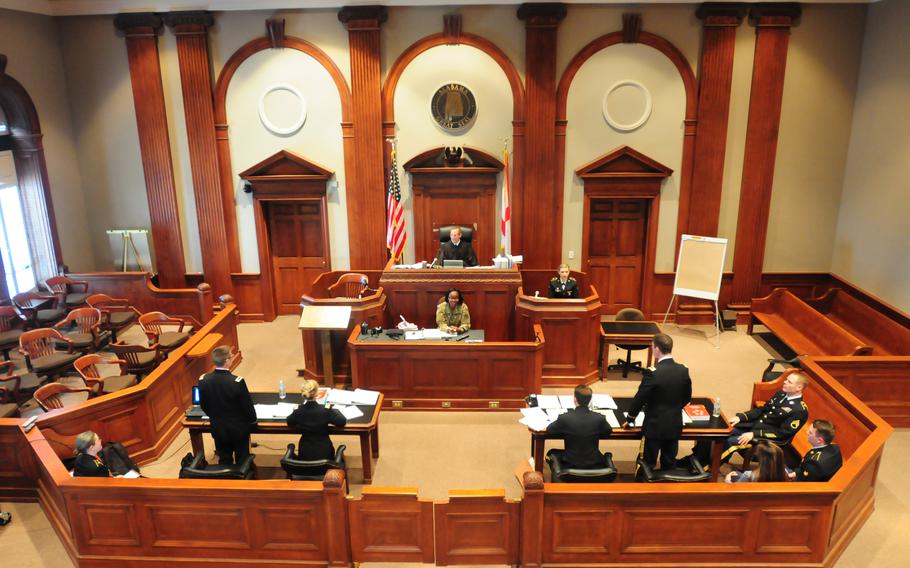
A training exercise in August 2018 of the 167th Theater Sustainment Command Judge Advocate General at the Calhoun County Courthouse in Anniston, Ala. (Katherine Dowd/U.S. Army National Guard)
Four independent military prosecution offices created by Congress have invoked their authority in the past two months to take the decision-making in 2,658 courts-martial from generals and admirals.
Under the new policy, which took effect Dec. 28, 162 specially trained attorneys serving in the Army, Navy, Air Force and Marines would have the last say on bringing court-martial charges against defendants for 13 specific offenses under the Uniform Code of Military Justice, the military’s legal statutes, the Pentagon said.
The crimes include murder, manslaughter, kidnapping, rape, certain sex crimes, crimes against children, intimidation such as stalking or retaliation, and the possession or distribution of pornographic or intimate images or other materials. Sexual harassment will become part of the jurisdiction of the counsels on Jan. 1, 2025.
Four special counsels have been created — one each for the Army, Navy, Marines and Air Force, which will also handle cases involving the Space Force. The attorneys will be among the 2,000 staffers working for the four offices, according to the Pentagon.
Officials with each service’s special trial counsel confirmed last week the number of cases investigated or prosecuted under the new policy. The Air Force said its counsel invoked court-martial authority in 970 cases. The Navy counsel took over 855 cases. The Army has moved 594 cases to its counsel. The Marines moved 239 cases.
Prior to the policy, commanding officers had great leeway on when to prosecute, who would sit on court-martial panels, and what the sentences would be, according to a Defense Department briefing in December.
Critics in Congress such as Sen. Kirsten Gillibrand, D-N.Y., and advocates for victims of sex crimes such as former Air Force prosecutor Don Christensen have said top military officers were not recommending charges in many sex abuse cases. In others, commanders were accused of reducing or negating punishments determined in courts-martial.
The new policy was supported by some lawmakers, such as Gillibrand, who had introduced legislation calling for special counsels more than a decade ago.
“It took a long time to pass my reforms, but finally, victims of sexual assault and other serious crimes have the independent, impartial justice system they deserve,” she has said.
It also had backing from others, including Sen. Joni Ernst, R-Iowa, who has said she was sexually harassed during her 23-year career in the Army, in which she rose to the rank of lieutenant colonel.
A majority in both chambers of Congress supported an end to command influence on courts-martial, according to an April 2021 report in the New York Times. The 2020 killing at Fort Cavazos, Texas, of Spc. Vanessa Guillen, whose reports of sexual harassment went uninvestigated prior to her death, drew national attention and helped spark the change. An internal Pentagon report cited by The Times said younger enlisted personnel did not trust their commands to fairly investigate complaints — a view that some Pentagon leaders said could undermine military retention and recruiting.
In January 2021, President Joe Biden ordered Defense Secretary Lloyd Austin to create a commission to review sexual assault in the military. The 13-member panel of civilian experts and former military leaders issued a report with 82 recommendations, including an end to command decisions in sex crime cases.
Austin endorsed the recommendations to create special prosecutors to handle sex crime cases, as did Biden. Congress passed the framework for what became the offices of special counsel in December 2021 and created training to staff the operations. Biden issued an executive order in July 2023 to amend the UCMJ to remove commanders from sex crime decisions.
“It’s the most important reform to our military justice system since the creation of the Uniform Code of Military Justice in 1950,” Austin said in a statement in December.
Under the new policy, new cases involving the 13 selected crimes that are reported after Dec. 28 will automatically go to the new special counsels. However, the policy also allows the counsels to review cases already underway and assume the prosecution from the existing command.
At least one case involving the 13 offenses has already been tried under the new policy and led to a conviction, according to Michelle McCaskill, communications director for the Army Office of Special Trial Counsel, which is based in Fort Belvoir, Va.
Army Sgt. Antonio Robert Aden, 27, an active-duty soldier on Okinawa, was found guilty on Feb. 7 of rape and sexual assault of victims in California and South Korea, according to McCaskill. The case was originally charged by U.S. Army Japan.
Aden was sentenced to 20 years in prison, a dishonorable discharge, a reduction to the rank of private, and forfeiture of all pay and allowances.
Aside from the 13 crimes moved to the special counsels, all other UCMJ violations remain under the authority of commanding officers, according to memos released in December by each service.
Commanding officers are required to forward any allegations regarding violations of the 13 crimes to the offices of the special counsels in their service to determine whether to pursue charges.
“Our office has been empowered to independently evaluate and prosecute cases based on the facts and evidence, free from outside influence,” Col. Rob Rodrigues, acting lead special trial counsel for the Army, said Dec. 28 —the first day of the new policy.